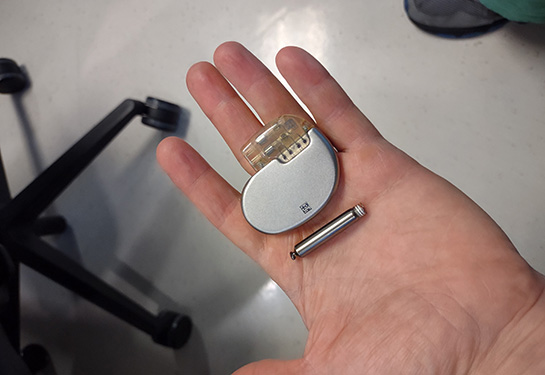Patient perspective gains importance in evaluating surgery success
UC Davis Health builds on its reporting of patient outcomes to meet new federal guidelines for hip and knee replacements
UC Davis Health has been asking patients for many years to assess their treatment outcomes. That’s why it is embracing a new federal requirement this year regarding patient-reported outcomes (PROs).
PROs are the patients’ own assessments of the results of treatment — whether and in what ways their treatment improved their condition and enhanced their quality of life. As of July, the Centers for Medicare and Medicaid Services has made patient-reported outcomes a performance measurement for reimbursement of hip and knee replacements.
Orthopedic surgeon Amanda Whitaker of the UC Davis Division of Pediatric Orthopaedics is among many medical professionals who welcome inclusion of PROs in formal health care records.
“Patient-reported outcomes are essential for us to know how our patients are doing before and after surgery. They are the center of high-quality patient care,” said Whitaker, an associate professor of orthopaedic surgery.
Patient-reported outcomes are essential for us to know how our patients are doing before and after surgery. They are the center of high-quality patient care.”—Amanda Whitaker, associate professor of orthopaedic surgery.
These are valid forms of evaluation because only the patients themselves know how they feel when they get out of bed in the morning or when kneeling to tie their shoes. They can most accurately report what it’s like to walk up a flight of stairs or extend their leg to depress the brake pedal of their car.
“PROs serve as a mechanism for patients to be heard and express their symptoms and opinions in a measurable way,” Whitaker explained. “Physicians can look at X-rays, physical exams and what patients tell us in the clinic, but often this is not the whole picture.”
Whitaker is also chief value officer for the Department of Orthopaedic Surgery and oversees protocols to ensure quality of patient care. “We want to know in everyday life, not just in limited clinic interactions, how their condition affects them.”
PROs have long been integral in the health system’s approach to tracking the condition of individual patients over time. UC Davis Health has an electronic system through which patients respond to multiple-choice questions and can add narrative descriptions. UC Davis and many other health care providers across the nation use the same digital questionnaire, enabling comparison of the experiences of a broad spectrum of patients — which can have far-reaching implications. PROs can influence how, when — and even if — procedures are performed.
“The collective experiences of patients have the power to change the way we practice medicine. Patient outcomes matter, and we as physicians are always looking at ways to improve their outcomes,” Whitaker said. “Patient-reported outcomes help physicians better take care of the individual patient who fills out the survey, and the responses of groups of patients can help us determine what we can do better.”
Whitaker notes that with Medicare now mandating PROs and tying them to reimbursements, hospital systems are recognizing the financial impact of patient-reported outcomes.
She regards patient-reported outcomes as key evidence-based information that can help surgeons increase patient satisfaction and quality of care. She thinks that the Medicare program is using the orthopaedics mandate as a model to inspire other health care disciplines to embrace PROs.
“I believe the PRO mandate for hip and knee replacements is a mechanism for hospital systems to see the value of PROs,” Whitaker said. “They should be involved in every aspect of medical care and supported by all hospital systems as a means to guide improvements in the quality of care.”






